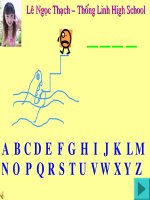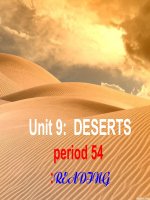E9 Unit 9 Read
Bạn đang xem bản rút gọn của tài liệu. Xem và tải ngay bản đầy đủ của tài liệu tại đây (1.21 MB, 21 trang )
<span class='text_page_counter'>(1)</span><div class='page_container' data-page=1></div>
<span class='text_page_counter'>(2)</span><div class='page_container' data-page=2>
<b>1. Snowstorm</b>
<b>2. Drought</b>
<b>3. Typhoon</b>
<b>4. Flood</b>
<b>5. Volcano</b>
<b>6. Earthquake</b>
<b>B</b>
<b>D</b>
<b>E</b>
<b>F</b>
<b>* Matching:</b>
<b>C</b>
<b>D</b>
<b>A</b>
</div>
<span class='text_page_counter'>(3)</span><div class='page_container' data-page=3>
I/ VOCABULARY
- tidal wave (n): sóng thần
- abrupt (adj) nhanh, bất ngờ
- shift (n)
sự dịch chuyển
- warn (v)
cảnh báo
- erupt (v) phun lên, phun trào
eruption (n) sự phun trào
- tornado (n) cơn lốc xoáy
</div>
<span class='text_page_counter'>(4)</span><div class='page_container' data-page=4>
A
B
1.Tidal wave (n)
2.Abrupt (adj)
3.Shift (n)
4.Warn (v)
5. Eruption (n)
6.Tornado (n)
7.Funnel-shaped
8.Suck up (v)
a. Cảnh báo
b. Hình phễu
c. Sóng thần
d. Hút lên
e. Bất ngờ
f. Sự dịch chuyển
g. Sự phun lên
h. Cơn lốc xoáy
</div>
<span class='text_page_counter'>(5)</span><div class='page_container' data-page=5>
<b>Thursday, March 22nd, 2012</b>
<b>Week: 30</b>
<b>Period: 57</b>
<b>UNIT 9:</b>
<b>LESSON 3</b>
<b>Natural disasters</b>
<b>READ</b>
I) <b>Vocabulary:</b>
<b>- tidal wave (n):sóng thần</b>
<b>- abrupt (adj) bất ngờ</b>
<b>- shift (n) sự dịch chuyển</b>
<b>- warn (v) cảnh báo</b>
<b>- erupt (v) phun trào </b>
<b>- tornado (n) cơn lốc xoáy </b>
<b>- funnel-shaped (adj) </b>
<b>- suck up (v) hút lên</b>
II).<b>READING</b>:
1)T/ F statements
</div>
<span class='text_page_counter'>(6)</span><div class='page_container' data-page=6>
<i><b>1) True or false? Check ( ) the boxes</b></i>
1. Most of the earthquakes in the world occur in the Ring of Fire.
2. The earthquake in Kobe in 1995
caused severe damage.
3. A huge tidal wave traveled from California
to Alaska and hit Anchorage in the 1960s.
4
.
Typhoon, hurricane and tropical storm are
different words for the same natural disasters.
5. The eruption of Mount Pinatubo is the
world's largest ever volcanic eruption.
6. A tornado looks like a funnel.
<b>T F </b>
Alaska to
California
volcanic eruption in more than 50 years
</div>
<span class='text_page_counter'>(7)</span><div class='page_container' data-page=7>
<b>Thursday, March 22nd, 2012</b>
<b>Week: 30</b>
<b>Period: 57</b>
<b>UNIT 9:</b>
<b>LESSON 3</b>
<b>Natural disasters</b>
<b>READ</b>
I) <b>Vocabulary:</b>
<b>- tidal wave (n):sóng thần</b>
<b>- abrupt (adj) bất ngờ</b>
<b>- shift (n) sự dịch chuyển</b>
<b>- warn (v) cảnh báo</b>
<b>- erupt (v) phun trào </b>
<b>- tornado (n) cơn lốc xoáy </b>
<b>- funnel-shaped (adj) </b>
<b>- suck up (v) hút lên</b>
II).<b>READING</b>:
1)T/ F statements
2) Comprehension questions
<b>2) Answer the following questions</b>
<b>a)How many people were killed by the </b>
<b>earthquake in Kobe in 1995 ?</b>
<b>b) What will happen when there is an abrupt </b>
<b>shift in the underwater movement of the </b>
<b>earth ?</b>
<b>c) What does “typhoon” mean ?</b>
<b>d) Can we predict a volcano ?</b>
</div>
<span class='text_page_counter'>(8)</span><div class='page_container' data-page=8>
<b>Thursday, March 22nd, 2012</b>
<b>Week: 30</b>
<b>Period: 57</b>
<b>UNIT 9:</b>
<b>LESSON 3</b>
<b>Natural disasters</b>
<b>READ</b>
I) <b>Vocabulary:</b>
<b>- tidal wave (n):sóng thần</b>
<b>- abrupt (adj) bất ngờ</b>
<b>- shift (n) sự dịch chuyển</b>
<b>- warn (v) cảnh báo</b>
<b>- erupt (v) phun trào </b>
<b>- tornado (n) cơn lốc xoáy </b>
<b>- funnel-shaped (adj) </b>
<b>- suck up (v) hút lên</b>
II).<b>READING</b>:
1)T/ F statements
2) Comprehension questions
<b>10</b>
<b>Team A</b>
<b>20</b>
<b>30</b>
<b>50</b>
<b>40</b>
<b>60</b>
<b>70</b>
<b>80</b>
<b>90</b>
<b>100</b>
<b><sub>100</sub></b>
<b><sub>30</sub></b>
<b><sub>10</sub></b>
<b><sub>50</sub></b>
<b><sub>20</sub></b>
<b><sub>40</sub></b>
<b><sub>60</sub></b>
<b><sub>70</sub></b>
<b><sub>80</sub></b>
<b><sub>90</sub></b>
</div>
<span class='text_page_counter'>(9)</span><div class='page_container' data-page=9>
<b>Thursday, March 22nd, 2012</b>
<b>Week: 30</b>
<b>Period: 57</b>
<b>UNIT 9:</b>
<b>LESSON 3</b>
<b>Natural disasters</b>
<b><sub>READ</sub></b>
I) <b>Vocabulary:</b>
<b>- tidal wave (n):sóng thần</b>
<b>- abrupt (adj) bất ngờ</b>
<b>- shift (n) sự dịch chuyển</b>
<b>- warn (v) cảnh báo</b>
<b>- erupt (v) phun trào </b>
<b>- tornado (n) cơn lốc xoáy </b>
<b>- funnel-shaped (adj) </b>
<b>- suck up (v) hút lên</b>
II).<b>READING</b>:
1)T/ F statements
2) Comprehension questions
<b>d) Can we predict a volcano?</b>
<b>-Yes, we can.</b>
</div>
<span class='text_page_counter'>(10)</span><div class='page_container' data-page=10>
<b>Thursday, March 22nd, 2012</b>
<b>Week: 30</b>
<b>Period: 57</b>
<b>UNIT 9:</b>
<b>LESSON 3</b>
<b>Natural disaster</b>
<b>READ</b>
I) <b>Vocabulary:</b>
<b>- tidal wave (n):sóng thần</b>
<b>- abrupt (adj) bất ngờ</b>
<b>- shift (n) sự dịch chuyển</b>
<b>- warn (v) cảnh báo</b>
<b>- erupt (v) phun trào </b>
<b>- tornado (n) cơn lốc xoáy </b>
<b>- funnel-shaped (adj) </b>
<b>- suck up (v) hút lên</b>
II).<b>READING</b>:
1)T/ F statements
2) Comprehension questions
<b>a) How many people were killed by the </b>
<b>earthquake in Kobe in 1995 ?</b>
</div>
<span class='text_page_counter'>(11)</span><div class='page_container' data-page=11>
<b>Thursday, March 22nd, 2012</b>
<b>Week: 30</b>
<b>Period: 57</b>
<b>UNIT 9:</b>
<b>LESSON 3</b>
<b>Natural disaster</b>
<b>READ</b>
I) <b>Vocabulary:</b>
<b>- tidal wave (n):sóng thần</b>
<b>- abrupt (adj) bất ngờ</b>
<b>- shift (n) sự dịch chuyển</b>
<b>- warn (v) cảnh báo</b>
<b>- erupt (v) phun trào </b>
<b>- tornado (n) cơn lốc xoáy </b>
<b>- funnel-shaped (adj) </b>
<b>- suck up (v) hút lên</b>
II).<b>READING</b>:
1)T/ F statements
2) Comprehension questions
</div>
<span class='text_page_counter'>(12)</span><div class='page_container' data-page=12>
<b>Thursday, March 22nd, 2012</b>
<b>Week: 30</b>
<b>Period: 57</b>
<b>UNIT 9:</b>
<b>LESSON 3</b>
<b>Natural disasters</b>
<b>READ</b>
I) <b>Vocabulary:</b>
<b>- tidal wave (n):sóng thần</b>
<b>- abrupt (adj) bất ngờ</b>
<b>- shift (n) sự dịch chuyển</b>
<b>- warn (v) cảnh báo</b>
<b>- erupt (v) phun trào </b>
<b>- tornado (n) cơn lốc xoáy </b>
<b>- funnel-shaped (adj) </b>
<b>- suck up (v) hút lên</b>
II).<b>READING</b>:
1)T/ F statements
</div>
<span class='text_page_counter'>(13)</span><div class='page_container' data-page=13>
<b>Thursday, March 22nd, 2012</b>
<b>Week: 30</b>
<b>Period: 57</b>
<b>UNIT 9:</b>
<b>LESSON 3</b>
<b>Natural disasters</b>
<b>READ</b>
I) <b>Vocabulary:</b>
<b>- tidal wave (n):sóng thần</b>
<b>- abrupt (adj) bất ngờ</b>
<b>- shift (n) sự dịch chuyển</b>
<b>- warn (v) cảnh báo</b>
<b>- erupt (v) phun trào </b>
<b>- tornado (n) cơn lốc xoáy </b>
<b>- funnel-shaped (adj) </b>
<b>- suck up (v) hút lên</b>
II).<b>READING</b>:
1)T/ F statements
2) Comprehension questions
<b>b) What will happen when there is an abrupt shift </b>
<b>in the underwater movement of the earth?</b>
</div>
<span class='text_page_counter'>(14)</span><div class='page_container' data-page=14>
<b>Thursday, March 22nd, 2012</b>
<b>Week: 30</b>
<b>Period: 57</b>
<b>UNIT 9:</b>
<b>LESSON 3</b>
<b>Natural disasters</b>
<b>READ</b>
I) <b>Vocabulary:</b>
<b>- tidal wave (n):sóng thần</b>
<b>- abrupt (adj) bất ngờ</b>
<b>- shift (n) sự dịch chuyển</b>
<b>- warn (v) cảnh báo</b>
<b>- erupt (v) phun trào </b>
<b>- tornado (n) cơn lốc xoáy </b>
<b>- funnel-shaped (adj) </b>
<b>- suck up (v) hút lên</b>
II).<b>READING</b>:
1)T/ F statements
2) Comprehension questions
:
<b>e) What does a tornado look like?</b>
</div>
<span class='text_page_counter'>(15)</span><div class='page_container' data-page=15>
<b>Thursday, March 22nd, 2012</b>
<b>Week: 30</b>
<b>Period: 57</b>
<b>UNIT 9:</b>
<b>LESSON 3</b>
<b>Natural disasters</b>
<b>READ</b>
I) <b>Vocabulary:</b>
<b>- tidal wave (n):sóng thần</b>
<b>- abrupt (adj) bất ngờ</b>
<b>- shift (n) sự dịch chuyển</b>
<b>- warn (v) cảnh báo</b>
<b>- erupt (v) phun trào </b>
<b>- tornado (n) cơn lốc xoáy </b>
<b>- funnel-shaped (adj) </b>
<b>- suck up (v) hút lên</b>
II).<b>READING</b>:
1)T/ F statements
</div>
<span class='text_page_counter'>(16)</span><div class='page_container' data-page=16>
<b>Thursday, March 22nd, 2012</b>
<b>Week: 30</b>
<b>Period: 57</b>
<b>UNIT 9:</b>
<b>LESSON 3</b>
<b>Natural Disasters</b>
<b>READ</b>
I) <b>Vocabulary:</b>
<b>- tidal wave (n):sóng thần</b>
<b>- abrupt (adj) bất ngờ</b>
<b>- shift (n) sự dịch chuyển</b>
<b>- warn (v) cảnh báo</b>
<b>- erupt (v) phun trào </b>
<b>- tornado (n) cơn lốc xoáy </b>
<b>- funnel-shaped (adj) </b>
<b>- suck up (v) hút lên</b>
II).<b>READING</b>:
1)T/ F statements
2) Comprehension questions
:
<b>e) Does a tornado look like a funnel ?</b>
</div>
<span class='text_page_counter'>(17)</span><div class='page_container' data-page=17>
<b>Thursday, March 22nd, 2012</b>
<b>Week: 30</b>
<b>Period: 57</b>
<b>UNIT 9:</b>
<b>LESSON 3</b>
<b>Natural disasters</b>
<b>READ</b>
I) <b>Vocabulary:</b>
<b>- tidal wave (n):sóng thần</b>
<b>- abrupt (adj) bất ngờ</b>
<b>- shift (n) sự dịch chuyển</b>
<b>- warn (v) cảnh báo</b>
<b>- erupt (v) phun trào </b>
<b>- tornado (n) cơn lốc xoáy </b>
<b>- funnel-shaped (adj) </b>
<b>- suck up (v) hút lên</b>
II).<b>READING</b>:
1)T/ F statements
</div>
<span class='text_page_counter'>(18)</span><div class='page_container' data-page=18>
* Complete the sentences:
<b>1. The majority of earthquakes occur ………</b>
<b>2. During the earthquake in Kobe, many people were killed when </b>
<b>………</b>
<b>3. A tidal wave can only occur when there is an abrupt shift in the </b>
<b>………....</b>
<b>4. In Australia, a tropical storm is known as a………...</b>
<b>5. The Chinese language gave us the word ……….</b>
<b>6. A tornado is a type of storm that pass overland below a </b>
<b>………</b>
<b>around the Pacific Rim</b>
<b>homes, office blocks and highways collapsed</b>
<b>underwater movement of the earth</b>
<b>cyclone</b>
<b>“typhoon”</b>
</div>
<span class='text_page_counter'>(19)</span><div class='page_container' data-page=19>
<b>Thursday, March 22nd, 2012</b>
<b>Week: 30</b>
<b>Period: 57</b>
<b>UNIT 9:</b>
<b>LESSON 3</b>
<b>Natural disasters</b>
<b>READ</b>
I) <b>Vocabulary:</b>
<b>- tidal wave (n):sóng thần</b>
<b>- abrupt (adj) bất ngờ</b>
<b>- shift (n) sự dịch chuyển</b>
<b>- warn (v) cảnh báo</b>
<b>- erupt (v) phun trào </b>
<b>- tornado (n) cơn lốc xoáy </b>
<b>- funnel-shaped (adj) </b>
<b>- suck up (v) hút lên</b>
II).<b>READING</b>:
1)T/ F statements
2) Comprehension questions
3) Complete the sentences
<b>III)Consolidation:</b>
<b>IV. Homework:</b>
<b>III) Consolidation:</b>
<b>1. Which natural disasters have you just studied </b>
<b>in the lesson today?</b>
<b>=> Earthquake, tidal wave, typhoon, volcano, tornado</b>
<b>2. What natural disasters often occur in Vietnam?</b>
</div>
<span class='text_page_counter'>(20)</span><div class='page_container' data-page=20>
IV.
Homework:
-Learn new words by heart
-Translate the text in to Vietnamese
</div>
<span class='text_page_counter'>(21)</span><div class='page_container' data-page=21></div>
<!--links-->









